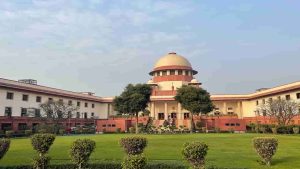Application filed in Supreme Court seeks impleadment in Gyanvapi Mosque dispute case

An application has been filed in the Supreme Court, seeking impleadment for appropriate appreciation of the facts-circumstances in the case related to Gyanvapi mosque dispute.
The application has been filed by BJP leader and lawyer Ashwini Kumar Upadhyay, who had earlier filed a public interest litigation before the Apex Court, challenging the Constitutional validity of the Places of Worship (Special Provisions) Act, 1991.
The Places of Worship (Special Provisions) Act, 1991 seeks to protect the status of all religious structures, as it stood on the date of independence by barring courts from entertaining cases, which raises dispute over the character of such places of worship.
As per the law, such cases already pending in courts would stand abated.
However, the Act provided exception for Ram-Janambhoomi site, which was the basis for courts, including the matter pending before both the High Court and the Supreme Court.
The Supreme Court had invoked this Act in 2019, while awarding the disputed site at Ayodhya to child deity Ram Lalla. The Apex Court had, however, reaffirmed that similar such cases cannot be entertained with respect to other sites in view of the Act.
The Central government had been issued a notice by the Supreme Court in March 2021 over a plea filed by BJP leader and Advocate Ashwini Upadhyay, challenging the validity of the Act.
In the current application, Upadhyay stated that only those places of worship should be protected, which were erected or constructed in accordance with personal law of the person erected/constructed them, but places erected or constructed in derogation of the personal law, cannot be termed as a ‘place of worship’.
However, as per the 1991 Act, such illegal acts of barbaric invaders had to be legalised by August 1947, it was submitted.
As per the application, Hindus, Jains, Buddhists and Sikhs have right to profess, practice propagate religion as provided in their religious scriptures and Article 13 prohibits from making law, which takes away their rights.
It further said that the status of mosque can be given only to such structures, which have been constructed according to tenets of Islam and Mosques constructed against the provisions contained in Islamic law cannot be termed as Mosque.
The application added that Muslims cannot assert any right in respect of any piece of land claiming to be Mosque, unless it has been constructed on legally owned and occupied virgin land.
As per the application filed by Upadhyay, a temple’s religious character does not change after the demolition of roof, walls, pillars, foundation and even offering Namaz.
It said a Mosque constructed at temple land cannot be a Mosque, not only for the reason that such construction is against Islamic law, but also on grounds that the property once vested in the deity continues to be the deity’s property and the right of deity and devotees are never lost, howsoever long illegal encroachment continues on such property.
The post Application filed in Supreme Court seeks impleadment in Gyanvapi Mosque dispute case appeared first on India Legal.
from India Legal https://ift.tt/qr0Th4d
Comments
Post a Comment